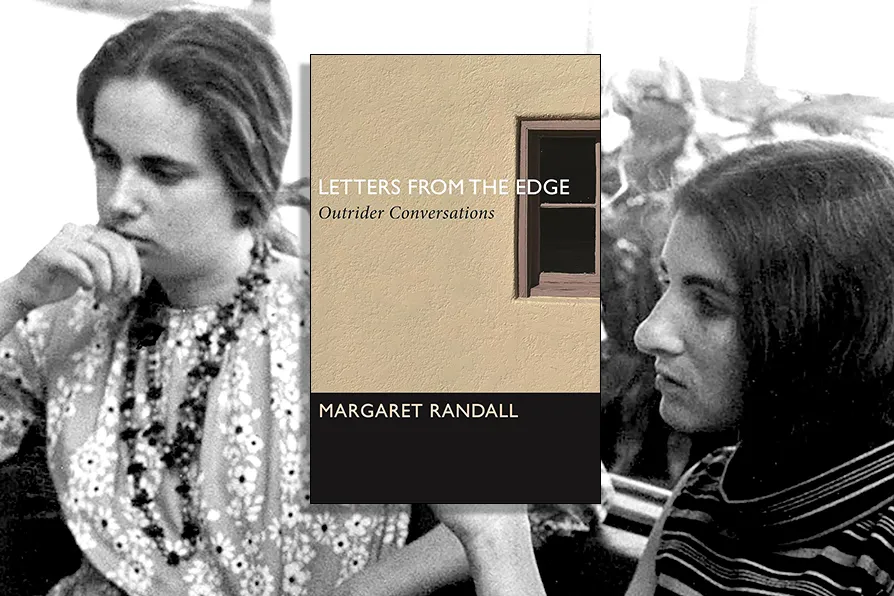DENNIS BROE searches the literary canon to explore why a duplicitous, lying, cheating, conning US businessman is accepted as Scammer-in-Chief
STEVEN ANDREW is ultimately disappointed by a memoir that is far from memorable

 FELLOW TRAVELLERS: Susan Sherman and Margaret Randall in Havana, Cuba 1968 / Pic: Ovaryian/CC
FELLOW TRAVELLERS: Susan Sherman and Margaret Randall in Havana, Cuba 1968 / Pic: Ovaryian/CC
Letters from the Edge, Outrider Conversations
Margaret Randall
New Village Press £18.99
BORN in 1936 to rather upper-class parents New Yorker Margaret Randall started her career as a poet, photographer and revolutionary in her late teens and has continued to inspire, agitate and publish right through to the present day.
Like many of her age and background, initial political involvement was prompted by the US civil rights movement, by concerns around threats to free speech from a resurgent McCarthyism and by opposition to the slaughter in Vietnam.
This was later complemented with uncompromising solidarity with socialist Cuba, with work in support of anti-imperialist and national liberation movements in Nicaragua and South Africa and by a non-party based affinity to leftist ideas, all activism which for a time led to her US citizenship being revoked.
Finally, her journey has been characterised by a lifelong insistence on the importance of the link between the personal and political forged by her experiences as a woman and a lesbian.
Involved in a bedazzling array of fields and financing herself by translation and by helping to produce many a seminal magazine, Randall has built an incredible network of friends and contacts, a lot of whom, like herself, would no doubt self-identify as “Outriders.“
Randalls latest work Letters from the Edge concentrates upon five such individuals and creatively uses a collection of personal reminiscences and correspondence to explore both their relationships to herself and society at large.
Quirky and often neglected communist Walter Lowenfels kicks off the collection in what was probably my favourite chapter. This is then followed by a discussion about Laurette Sejourne and her partner Arnaldo Orfila, the first an unorthodox but groundbreaking Marxist archaeologist from Mexico, the second a pioneering and influential Argentinian publisher.
US poet Susan Sherman is next on the list, someone whom Randall characterises as ”a woman before her time” and its evident that the two shared many an interest.
Painter Greg Smith ends the book, an individual who the author bumped into by chance but whose thoughts on the increasingly repressive nature of US politics take us right up to the era of Trump.
And the result? Sad as I am to admit it my response was a bit mixed. It’s a gentle and often pleasurable read and one which got me looking up not only the individuals discussed but also some of the historical events referred to which had shaped their lives.
Randall starts the collection by an approving quote from the legendary wordsmith Kenneth Rexroth who once noted that “Against the ruin of the world, there is only one defence — the creative act.“ And it’s evident that this was a very well intentioned work that a huge amount of research has gone into.
However, while I found some passages worthwhile and of note, other were far less so. It’s indicative that just a few days after a first reading I could remember very little of the text. I often found myself more than a little bored.
The reproduction of, for example, infinite letters around publications, deadlines, formats, and fees being no doubt significant to the author but far less memorable to the reader.
Likewise, while many might find the reproduction of letters both touching and meaningful, they often veered away from the “Outrider” theme with no attempt to establish necessary context.
Randall is a talented and prodigious writer and has published over two hundred books. Unfortunately, Letters from the Edge wouldn’t come anywhere near the top of my recommended list.

JULIA TOPPIN recommends Patti Smith’s eloquent memoir that wrestles with the beauty and sorrow of a lifetime

STEVE ANDREW enjoys an account of the many communities that flourished independently of and in resistance to the empires of old

STEVEN ANDREW welcomes a fine introduction to FC United of Manchester, the team set up in opposition to Manchester United

STEVEN ANDREW is moved beyond words by a historical account of mining in Britain made from the words of the miners themselves









